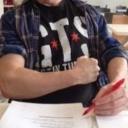Yahoo Answers is shutting down on May 4th, 2021 (Eastern Time) and the Yahoo Answers website is now in read-only mode. There will be no changes to other Yahoo properties or services, or your Yahoo account. You can find more information about the Yahoo Answers shutdown and how to download your data on this help page.
Can you put digits 1 thru 9 in a 3 by 3 grid so that each row and diagonal is a prime number?
Each digit must be used only once. The rows and top left to lower right diagonal and top right to lower left diagonal must be three digit prime numbers.
2 Answers
- rotchmLv 74 weeks agoFavorite Answer
Yes I can. Quite 'easy' to find. Just a little logic and fiddlin.
Perhaps there are more, but that would take me maybe 10 mins extra to scribble, but that I will leave for you.
281
467
359
- az_lenderLv 74 weeks ago
OK, it should be plain that the five 3-digit prime numbers cannot end in anything but 1, 3, 7, 9. So the 1, 3, 7, and 9 are somewhere in the right-hand row and the lower left box. The other five boxes will contain 2, 4, 5, 6, 8 in some order.
First I'll think about the upper right to lower left diagonal, as it must both begin and end with one of the odd digits other than 5. Possibilities are 127, 149, 157, 163, 167, 347, 349, 359, 367, 389, 743, 751, 761, 769, 941, 947, 953, 967, 983. The 3-digit prime in the bottom row will also come from this list, and will start with the LAST digit of which one of these (19) numbers is found along the top-right to lower-left diagonal. So, reading from top right to lower left and then continuing to lower right, we have these possilities:
12743, 12769, 14953, 14967, 14983, 15743, 15769, 16347, 16349, 16359, 16389,
and many more. I'm going to work with these first, even though I haven't eliminated the others.
12743: in this case, the middle row must end with 29, and can only be 829. But the top row can't be 651 or 561, as these are multiples of 3. So 12743 is out.
12769: in this case, the middle row must end with 23, and could be 523 or 823. The top row can't be 451 (divisible by 11) but could be the prime 541. But then the top left to bottom right diagonal would be 529 ( = 23 x 23 ) so it's no good. Neither 841 nor 481 is prime, so the 12769 candidate is out.
14953: in this case, the middle row must end with 47, and can only be 647. The top row would then be the prime 281 or the prime 821. Then the top left to lower right diagonal would be divisible by 3, alas. So 14953 is out.
14967: in this case, the middle row must end with 43, but putting any of 2,5,8 in front of this produces a multiple of 3. So 14967 is out.
14983: in this case, the middle row must end with 47, and can only be 647. The top row would then be the prime 251 or the prime 521. But then the top left lower right diagonal would be divisible by 3. So 14983 is out.
And now I'm bored. So you'll have to keep going on your own. Use the website byjus.com, which has a handy list of the primes from 1 to 1000.



